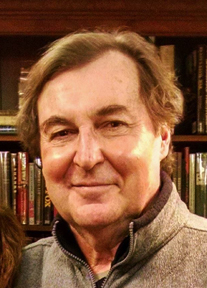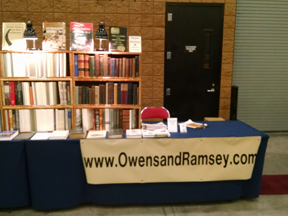Time to Talk (Civil War) Books: A Conversation with Marc Ramsey—part five

In today’s final installment of my conversation with Marc Ramsey of Owens & Ramsey Bookseller, we talk a bit about the overall health of the book business and how that impacts Marc as a specialized seller.
Chris Mackowski: Let me go back to something you said a few minutes ago about paperbacks. You said we all have attitudes about paperbacks, and that does strike a chord because some people do seem to be a little snobby about hardcovers versus paperbacks.
Marc Ramsey: Most of the people in the world that we populate love hardbacks. But there’s a real place for paperbacks, and everybody realizes there’s a real necessity for them.
I made the point recently on a book panel that I’m afraid for the publishing of paperbacks. E-readers threaten paperbacks more than they threaten hardbacks. People who love books love hardbacks—first editions, get them signed by the author, put them on the shelf, and they’re there. The paperbacks have a use. You’re going to the beach. You’re going to the battlefield. It’s muddy. You want to have something with you. You’re on a plane, you know, you’re traveling. We love our paperbacks. But the e-readers—even though I think that fad may be dying down, although young people are definitely helping those sales—although the sales of Kindles are down, apparently—but I think it’s going to cut into the paperback market more than our market.
So, I don’t mean to demean paperbacks, especially trade paperbacks. They’re beautiful. And when I travel, I like to have a paperback in my briefcase, and I don’t need to worry about banging it around that much, whereas if I spill coffee on one of my signed first editions (groans, then laughs) which has happened. . . .
 CM: You and I have an understanding the economics of some of those factors involved, too, as far as what it costs to publish a hardcover versus a paperback.
CM: You and I have an understanding the economics of some of those factors involved, too, as far as what it costs to publish a hardcover versus a paperback.
MR: And then you have some publishers that print paperbacks that are seventy dollars. I just had to stop doing business with them. I have accounts there, but their prices get crazy.
[He cites specific publishers but asks not to mention them by name. He mentions one academic publisher that’s doing more reprints.] You can get a new copy for fifty bucks. I don’t want a new copy for fifty bucks, and I’m not going to be able to sell them for fifty bucks. In my little shop, I want to sell new books. But I just can’t sell them for that.
“Well, we have to charge that because of the publishing costs,” they tell me. And I understand. That’s a dilemma. It really is.
That’s why, with some publishers like Savas Beatie, you have the choice of a paperback or an e-reader, as well as the hardback. But you’ve just got to do it all.
Another thing I like about Savas: Their books retail in the twenties or thirties. And I can sell a book all day long for $33. And they provide bookplates. They’re the one publisher I can at least get some kind of presence from the author. The bookplates are good—not quite as good as actual signing, but still good.
CM: You talk about the use of a paperback for beach reading or out on the battlefield, but I find an e-reader is actually inconvenient for some of those sorts of situations—at least how I use my paperbacks.
MR: I would think so. Looking at the screen, if you can in the sunlight. I do podcasts. Those are all done with headsets. I’ve never walked around the battlefield with one. I like walking around with a guide. We can walk around the battlefield and just talk. If there’s a group, I’m one of the geeks in the back of the crowd who asks questions: “Ah, shit, it’s him.” I take tours around town and on the battlefields, and from time to time we go down to the Museum of the Confederacy while we still can. I love taking tours of the house. Those tour guides who take people through the house are great. But I usually am the wiseguy in the back. (laughs) They probably put out some kind of alert: “Oh, it’s Ramsey.” (laughs) “What’s he going to ask this time?”
CM: So, you literally have your finger on the pulse of the book business: Are books going away or not?
MR: Naw. Remember when they invented television, and they said, “That’s the end of radio.” Same thing. We have to adjust. We have to stay informed and see where the trends are. But people that like books will always need the books.
Now, there’s no denying that we’re living with a certain attrition rate. The world of Civil War book readers—a lot of them are getting old and dying, and I don’t see them getting replaced by like numbers of young people. There are young people who are buying and reading books and are fascinated by the world of history, but not as many as we see dying.
We’re more attuned to this than ever. When we analyze trends and where the business is going to go, in the early days, we never thought we’d have the problem of outliving our customers—and that, indeed, is the case.
Two years ago, a lady who spent a couple hundred dollars a month with us passed away. She was also a friend. We’d get together in Williamsburg and stuff. Betty. Wonderful lady. Her son called me up a couple months later and said, “Mark, mom wanted you to have the books.”
I said, “What?”
He said, “You were mentioned in her will. Come get the books.”
I said, “Jim, what do you think about that?”
“Mom loved you guys, and mentioned you in the will. She said you should get the books, so that’s what needs to happen.”
So I drove up to Westchester, Pennsylvania—just outside Westchester—and picked up the books from Betty’s library. I couldn’t believe it. Months later, Jim and his wife, Linda, came down here, and we spread Betty’s ashes over at Hollywood. She loved it there. She was a Southern girl who ended up living in the north, but she wanted her ashes spread at Hollywood, so we went up to the Circle of the Presidents, exactly where she said, and spread her ashes. But that—whew—that got Jill and I really thinking, “Man.”
It’s happened a couple of times over the past couple of years where I’ve gone in, gotten the books from the widow, gone into the library, and there’s my handwriting in so many of the books.
And it’s kind of not so good for us because, like. . . . This one fellow, I’m in his office, and I know he was looking at me, and I’m hearing him: “Don’t rip him off, Ramsey.” So, I’m feeling really awkward. So, consequently, I’m paying a lot more for the books than I normally would.
CM: That’s kind of funny: You sell all these books to these people and the books end up coming back to you.
MR: Coming back. Or, I’ll go to a book sale. Broadfoot—and he’s in North Carolina—sometime you’ve gotta go to Broadfoot’s of Wendell—it’s out in the country, but it’s a house full of books. And he sells ‘em cheap. Sometimes, when I can’t find a book anywhere else, I’ll drive down there. And he has a sale, when he’s bought a collection. Well, a couple weeks ago, he had a sale and a bunch of us were down there, and I found at least five books with my handwriting in them. I write “1st. ed.” I don’t write out “first edition.” And then I put the price. Nobody writes exactly like—well, nobody else, really. But I found five books! And this collection had come from somewhere like Minnesota—I don’t know—somewhere way out west. Somewhere where I don’t have a customer. And they even told me the name—actually, it was two collections—and I didn’t know the names, but they were my own books. It just shows you how books travel. You know, that book had been in this shop at some point. Probably sold at a Civil War show or something.
CM: When we talk about books, we talk about “so-and-so’s book,” but a book is an actual artifact, an individual, physical thing, as well as a kind of published work.
MR: They are. And maybe it’s a physical way to hold the history. People love the history. Well, the medium that they can touch, first and foremost, is a book. And if I’m thinking of the battle of Cedar Creek or whatever, I can go to my own library and pick up the information on Cedar Creek—and I’m actually touching the battle of Cedar Creek for a little while. Or if I want to get close to Hancock for a few minutes—and Winfield Hancock is a fascinating guy—I can go to my book, Hancock the Superb. So it’s a way of physically touching the history. Books are so important.
It’s funny: there must be a gene for books. ’Cause like I said, I come from a family where they don’t read books—so how come I do? My old man was a great guy, an iron worker, a World War II veteran. I would see him with a book—I guess he was as close to a book person as I had. I would see him with a book once in a while, but he liked picture books. So, I don’t know. I must’ve gotten a gene from my grandfather or something.
And it’s funny: the people we deal with—and it’s such a pleasure, the crowd that we keep—they don’t just have a passing interest in books. The people on our mailing list and the people we associate with and the shows and conferences, they love books. It’s a real important thing in their life.
Thanks again to you both, and you Marc for mentioning us and supporting our work. We do everything we can do support our sellers, our customers, and the quality of the history we publish.
Have a nice weekend.
I know people who came to history through visiting parks, through living history, through wargaming even – but one thing they all have in common: they love books. The written word seems to be our most important connection to history. Thanks for the interview, great read.
Re: hard cover vs. paperbacks: do you own the book or does it own you? I sometimes wonder if the books collected actually ever get read.